2反义疑问句
反义疑问句讲解及答案
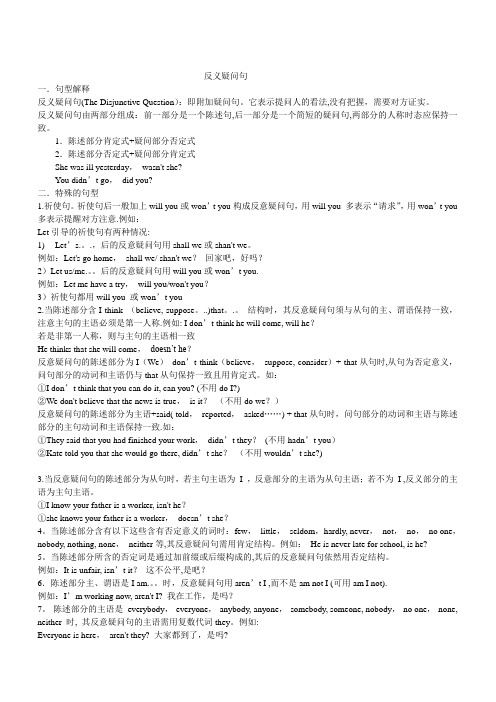
反义疑问句一.句型解释反义疑问句(The Disjunctive Question):即附加疑问句。
它表示提问人的看法,没有把握,需要对方证实。
反义疑问句由两部分组成:前一部分是一个陈述句,后一部分是一个简短的疑问句,两部分的人称时态应保持一致。
1.陈述部分肯定式+疑问部分否定式2.陈述部分否定式+疑问部分肯定式She was ill yesterday,wasn't she?You didn’t go,did you?二.特殊的句型1.祈使句。
祈使句后一般加上will you或won’t you构成反意疑问句,用will you 多表示“请求”,用won’t you 多表示提醒对方注意.例如:Let引导的祈使句有两种情况:1) Let’s.。
.,后的反意疑问句用shall we或shan't we。
例如:Let's go home,shall we/ shan't we?回家吧,好吗?2)Let us/me.。
后的反意疑问句用will you或won’t you.例如:Let me have a try,will you/won't you?3)祈使句都用will you 或won’t you2.当陈述部分含I think (believe, suppose。
..)that。
.。
结构时,其反意疑问句须与从句的主、谓语保持一致,注意主句的主语必须是第一人称.例如: I don’t think he will come, will he?若是非第一人称,则与主句的主语相一致He thinks that she will come,doesn’t he?反意疑问句的陈述部分为I(We)don’t think(believe,suppose, consider)+ that从句时,从句为否定意义,问句部分的动词和主语仍与that从句保持一致且用肯定式。
如:①I don’t think that you can do it, can you? (不用do I?)②We don't believe that the news is true,is it?(不用do we?)反意疑问句的陈述部分为主语+said( told,reported,asked……) + that从句时,问句部分的动词和主语与陈述部分的主句动词和主语保持一致.如:①They said that you had finished your work,didn’t they?(不用hadn’t you)②Kate told you that she would go there, didn’t she?(不用wouldn’t she?)3.当反意疑问句的陈述部分为从句时,若主句主语为I ,反意部分的主语为从句主语;若不为I ,反义部分的主语为主句主语。
反义疑问句例句20个
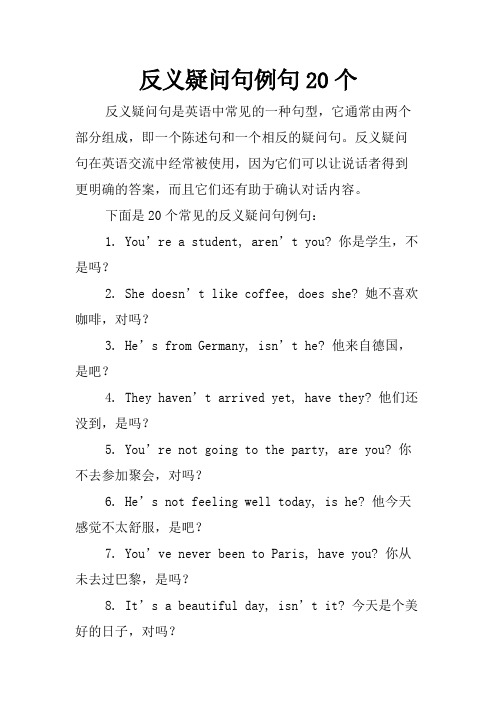
反义疑问句例句20个反义疑问句是英语中常见的一种句型,它通常由两个部分组成,即一个陈述句和一个相反的疑问句。
反义疑问句在英语交流中经常被使用,因为它们可以让说话者得到更明确的答案,而且它们还有助于确认对话内容。
下面是20个常见的反义疑问句例句:1. You’re a student, aren’t you? 你是学生,不是吗?2. She doesn’t like coffee, does she? 她不喜欢咖啡,对吗?3. He’s from Germany, isn’t he? 他来自德国,是吧?4. They haven’t arrived yet, have they? 他们还没到,是吗?5. You’re not going to the party, are you? 你不去参加聚会,对吗?6. He’s not feeling well today, is he? 他今天感觉不太舒服,是吧?7. You’ve never been to Paris, have you? 你从未去过巴黎,是吗?8. It’s a beautiful day, isn’t it? 今天是个美好的日子,对吗?9. He can’t swim, can he? 他不会游泳,对吗?10. She doesn’t like pizza, does she? 她不喜欢披萨,对吗?11. You’re not afraid of heights, are you? 你不怕高,对吗?12. They won’t be able to attend the meeting, will they? 他们不能参加会议,对吗?13. They’re leaving tomorrow, aren’t they? 他们明天要走了,对吗?14. He’s never been skiing, has he? 他从未滑过雪,对吗?15. She’s not going to the concert, is she? 她不去音乐会,对吗?16. You’re not worried about the exam, are you? 你不担心考试吧,对吗?17. He didn’t eat breakfast this morning, did he? 他今天早上没吃早餐,对吗?18. They’r e not going to the beach, are they? 他们不去海边,对吗?19. You’ve already seen the movie, haven’t you? 你已经看过这部电影了,对吗?20. He’s not coming to the party, is he? 他不来参加聚会,对吗?在使用反义疑问句时,需要注意的是,它们并不总是表示对话者的不确定或疑虑。
18种特殊反义疑问句

初中英语18种特殊的反意疑问句1.祈使句。
祈使句后一般加上will you或won't you构成反意疑问句,用will you 多表示“请求”,用won't you 多表示提醒对方注意。
例如:Look at the blackboard, will you/ won't you?看黑板,好吗?Let引导的祈使句有两种情况:1)Let's...,后的反意疑问句用shall we或shan't we。
例如:Let's go home, shall we/ shan't we? 回家吧,好吗?还可以用may I来表示征求对方的同意或许可。
2)Let us/me...后的反意疑问句用will you或won't you。
例如:Let me have a try, will you/won't you? 让我试一试,行吗?2.感叹句。
感叹句后加反意疑问句时,其反意疑问句需用be的一般现在时态的否定形式。
例如:What fine weather, isn't it? 多好的天气啊,是吧?3. 当陈述部分谓语动词是need, dare, used to,且这些词被用作实义动词时,其反意疑问句需用do的适当形式。
例如:He needs help, doesn't he?他需要帮助,是吗?4.陈述部分主、谓语是I am...时,反意疑问句用aren't I 或ain't I ,而不是am not I (可用am I not)。
例如:I'm working now, ain't I? 我在工作,是吗?5.陈述部分的主语是everything, nothing, anything或something 时,反意疑问句的主语应用代词it。
例如:Something is wrong with my radio, isn't it? 我的收音机出毛病了,是吧?6.陈述部分的主语是everybody, everyone, anybody, anyone, somebody, someone, nobody, no one, none, neither 时, 其反意疑问句的主语需用复数代词they。
反义疑问句的14种常考特殊用法
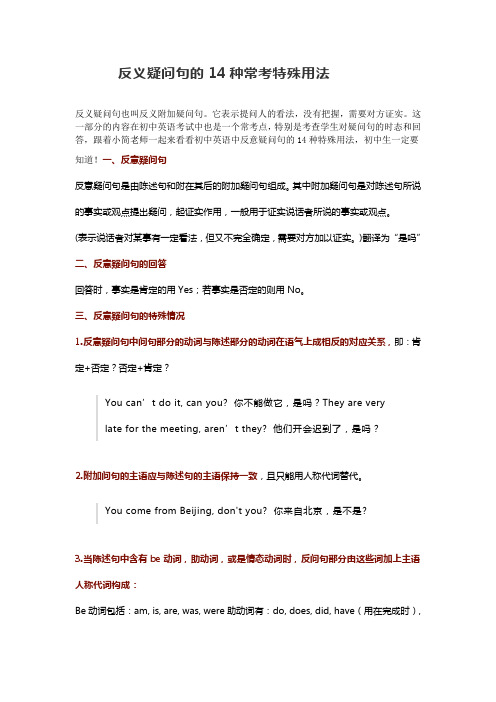
反义疑问句的14种常考特殊用法反义疑问句也叫反义附加疑问句。
它表示提问人的看法,没有把握,需要对方证实。
这一部分的内容在初中英语考试中也是一个常考点,特别是考查学生对疑问句的时态和回答,跟着小简老师一起来看看初中英语中反意疑问句的14种特殊用法,初中生一定要知道!一、反意疑问句反意疑问句是由陈述句和附在其后的附加疑问句组成。
其中附加疑问句是对陈述句所说的事实或观点提出疑问,起证实作用,一般用于证实说话者所说的事实或观点。
(表示说话者对某事有一定看法,但又不完全确定,需要对方加以证实。
)翻译为“是吗”二、反意疑问句的回答回答时,事实是肯定的用Yes;若事实是否定的则用No。
三、反意疑问句的特殊情况1.反意疑问句中问句部分的动词与陈述部分的动词在语气上成相反的对应关系,即:肯定+否定?否定+肯定?You can’t do it, can you? 你不能做它,是吗?They are verylate for the meeting, aren’t they? 他们开会迟到了,是吗?2.附加问句的主语应与陈述句的主语保持一致,且只能用人称代词替代。
You come from Beijing, don't you? 你来自北京,是不是?3.当陈述句中含有be动词,助动词,或是情态动词时,反问句部分由这些词加上主语人称代词构成:Be动词包括:am, is, are, was, were助动词有:do, does, did, have(用在完成时),has(用在完成时)等情态动词有:can, could, may, might, must, will, would, shall, shouldHe will go home, won’t he? 他要回家了,是吗?She doesn’tlike to eat popcorn, does she? 她不喜欢吃爆米花,是吗?4.have的不同用法,反义疑问句用不同的动词(1)have 表“有”时,反义疑问句谓语动词用have/do都行He has a new car, doesn’t/hasn’t he?(2)have表“吃,喝,玩,度过,举办”等是,反义疑问句谓语动词用doHe has supper at home every day, doesn’t he?They had agood time in Beijing, didn’t they?(3)have to表“不得不,必须”时,反义疑问句谓语动词用doKite has to help her mother, doesn’t she?(4)had better表“最好”时,反义疑问句谓语动词用hadWe had better go to school at once, hadn't we?(5)have用在完成时中,反义疑问句谓语动词用haveThey have known the matter, haven’t they?5.(1)反意疑问句的陈述部分带有little, few, never, hardly, seldom,nobody, nothing, no one, none, neither等否定意义的词时,问句部分用肯定式。
2.反意疑问句

反意疑问句又叫附加疑问句,是指当提 问的人对前面所叙述的事实不敢肯定,而 需要向对方加以证实时所提出的问句。
如果前一部分用肯定式,后一部分一般用 否定式;反之,前一部分为否定式,后一部 分要用肯定式,即“前肯定后否定,前否定 后肯定”。
对反意疑问句的回答, 无论问题的提法如何, 如果事实是肯定的, 就用yes, 事实是否定的, 就要 用no。
二
简单句式
结构中反意疑问句的
运用
1.当陈述句部分的主语是名词时, 反意疑问句
的主语必须用人称代词来代替。
Your brother has gone to the has hasn’t he library,________?
2. 当陈述句的主语是指示代词this, that时,
反意疑问句的主语用it代替;
is it That isn’t a useful book,_____?
指示代词是these, those时, 反意疑问句的 主语用they代替。如:
These are important reading materials, aren’t they ________?
3. 当陈述句部分是I am…时, 反意疑问 句部分通常要用aren’t I;
(2).句中陈述部分没有表示过去的时间状语,这
时附加谓语中的动词就用 现在完成时。 You must have studied English for many years, haven’t you? 你一定学了多年的英语,不是吗? (现在完成时) (3).陈述部分的动词表示经常性的动作或状态, 附加谓语部分的动词就用 一般现在时。 He must be from the south, isn’t he? 他一定是南方人,对吗? (一般现在时)
反义疑问句知识点
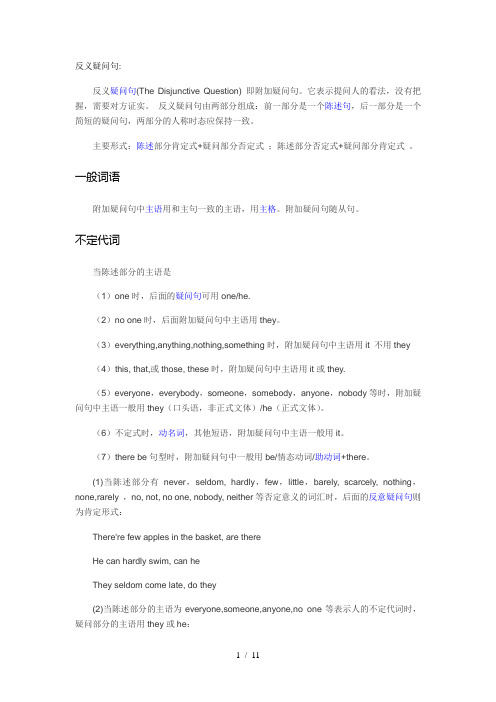
反义疑问句:反义疑问句(The Disjunctive Question) 即附加疑问句。
它表示提问人的看法,没有把握,需要对方证实。
反义疑问句由两部分组成:前一部分是一个陈述句,后一部分是一个简短的疑问句,两部分的人称时态应保持一致。
主要形式:陈述部分肯定式+疑问部分否定式;陈述部分否定式+疑问部分肯定式。
一般词语附加疑问句中主语用和主句一致的主语,用主格。
附加疑问句随从句。
不定代词当陈述部分的主语是(1)one时,后面的疑问句可用one/he.(2)no one时,后面附加疑问句中主语用they。
(3)everything,anything,nothing,something时,附加疑问句中主语用it 不用they(4)this, that,或those, these时,附加疑问句中主语用it或they.(5)everyone,everybody,someone,somebody,anyone,nobody等时,附加疑问句中主语一般用they(口头语,非正式文体)/he(正式文体)。
(6)不定式时,动名词,其他短语,附加疑问句中主语一般用it。
(7)there be句型时,附加疑问句中一般用be/情态动词/助动词+there。
(1)当陈述部分有never,seldom, hardly,few,little,barely, scarcely, nothing,none,rarely ,no, not, no one, nobody, neither等否定意义的词汇时,后面的反意疑问句则为肯定形式:There're few apples in the basket, are thereHe can hardly swim, can heThey seldom come late, do they(2)当陈述部分的主语为everyone,someone,anyone,no one等表示人的不定代词时,疑问部分的主语用they或he:Everyone in your family is a teacher, aren’t they\isn't he?(3)当陈述部分的主语为everything,something,anything.nothing等表示物的不定代词时,疑问部分的主语用it:Something is wrong with your watch, isn’t it(4)当陈述部分含有否定意思的词是unhappy,dislike,unfriendly,等含有否定词缀的派生词,也就是有un,dis,no-前缀、-less后缀等含有词缀而意思否定的词,当做肯定句处理,疑问部分要用否定形式。
反义疑问句讲解与练习

反义疑问句讲解与练习一、含be(is, are, was, were)动词的反意疑问句(1)句型1:主语+ be+其它,isn’t(aren’t, wasn’t, weren’t)+ 主语?句型2:主语+ be not+其它,is(are, was, were) + 主语?① You are from America, aren’t you? Yes, I am. No, I’m not.② It isn’t very cold today, is it? Yes, it is. No,it isn’t.(2)注意:There be句型例:There is an old picture on the wall, isn’t there?二、带行为动词反意疑问句(不含be和情态动词)句型1:主语+动词+其他,do/did/does + not +主语?句型2:主语+did/does/do+not +动词原形+其他,did/do/does+其他?例:You often watch TV in the evening, don’t you? Yes, I do. No, I don’t.三、含有情态动词的反意疑问句,反义疑问句中的动词使用情态动词。
例:The students must study hard, mustn’t they? Yes, they must. No, they needn’t.注意:You must go home now, needn’t you? Yes, I must. No, I needn’t.★注意:There be句型的一般将来时① There will be a basketball match tomorrow, won’t there?Yes, there will. No, there won’t.② There won’t be too much pollution in the future, will there?Yes, there will. No, there won’t.四、反义疑问句的回答:答语要和实际情况相符合,遵循“实事求是”的原则。
反义疑问句(最全)
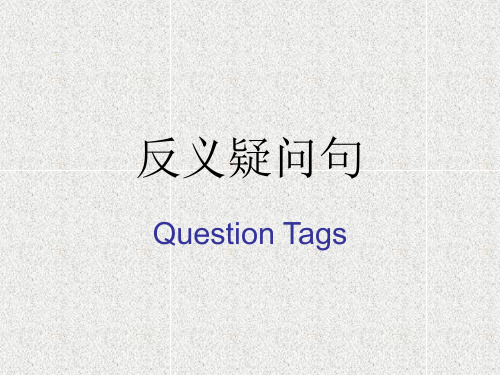
c. 但若是以 I/we think, believe, expect, suppose, imagine等引导的宾语从句,疑问部分与宾语从句相对 应构成反意疑问句 I don't think he is bright, is he? We believe she can do it better, can't she?
—、一些特殊结构的反义疑问句:
1.含有ought to 的反意疑问句,陈述部分是肯定的,疑 问部分用shouldn’t / oughtn’t +主语。 He ought to know what to do, oughtn’t he? / shouldn’t he?
2.陈述部分有have/has to +v. (had to + v.),疑问部分常 用don’t/doesn’t +主语(didn’t +主语)。 We have to get there at eight tomorrow, don’t we?
It is impossible, isn’t it? He is not unkind to his classmates, is he?
•
感 谢 阅
读感 谢 阅
读
hardly, rarely, little等否定含义的词时,疑问部分用肯定
含义。
The man
made no answer, did he?
Some plants
反义疑问句原则
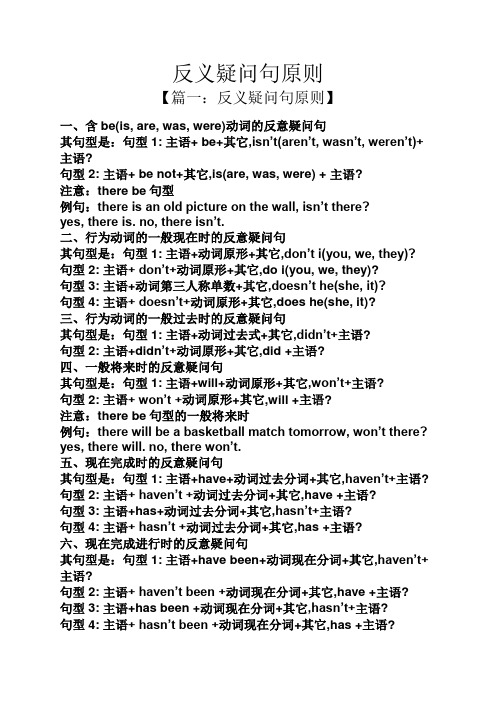
反义疑问句原则【篇一:反义疑问句原则】一、含be(is, are, was, were)动词的反意疑问句其句型是:句型1: 主语+ be+其它,isn’t(aren’t, wasn’t, weren’t)+ 主语?句型2: 主语+ be not+其它,is(are, was, were) + 主语?注意:there be句型例句:there is an old picture on the wall, isn’t there?yes, there is. no, there isn’t.二、行为动词的一般现在时的反意疑问句其句型是:句型1: 主语+动词原形+其它,don’t i(you, we, they)?句型2: 主语+ don’t+动词原形+其它,do i(you, we, they)?句型3: 主语+动词第三人称单数+其它,doesn’t he(she, it)?句型4: 主语+ doesn’t+动词原形+其它,does he(she, it)?三、行为动词的一般过去时的反意疑问句其句型是:句型1: 主语+动词过去式+其它,didn’t+主语?句型2: 主语+didn’t+动词原形+其它,did +主语?四、一般将来时的反意疑问句其句型是:句型1: 主语+will+动词原形+其它,won’t+主语?句型2: 主语+ won’t +动词原形+其它,will +主语?注意:there be句型的一般将来时例句:there will be a basketball match tomorrow, won’t there? yes, there will. no, there won’t.五、现在完成时的反意疑问句其句型是:句型1: 主语+have+动词过去分词+其它,haven’t+主语?句型2: 主语+ haven’t +动词过去分词+其它,have +主语?句型3: 主语+has+动词过去分词+其它,hasn’t+主语?句型4: 主语+ hasn’t +动词过去分词+其它,has +主语?六、现在完成进行时的反意疑问句其句型是:句型1: 主语+have been+动词现在分词+其它,haven’t+主语?句型2: 主语+ haven’t been +动词现在分词+其它,have +主语?句型3: 主语+has been +动词现在分词+其它,hasn’t+主语?句型4: 主语+ hasn’t been +动词现在分词+其它,has +主语?七、含有情态动词的反意疑问句其句型是:句型1: 主语+情态动词+动词原形+其它,情态动词否定形式+主语?句型2: 主语+情态动词否定形式+动词原形+其它,情态动词+主语?注意:you must go home now, needn’t you?yes, i must. no, i needn’t.★值得注意的是有时英语的谓语动词并不用否定式(即没加上not),而是用上了“never, little, few, hardly, nothing, nobody”等词,这时该陈述句也属于否定句,因此,反意疑问句的后半部分应用肯定疑问式.例句:you have never been to beijing, have you?yes, i have. no, i haven’t.【篇二:反义疑问句原则】反意疑问句是英文中常见的一种句型,它提出情况或看法,询问对方同意与否,被广泛应用于英语口语。
unit2 反义疑问句 以及短语和句子
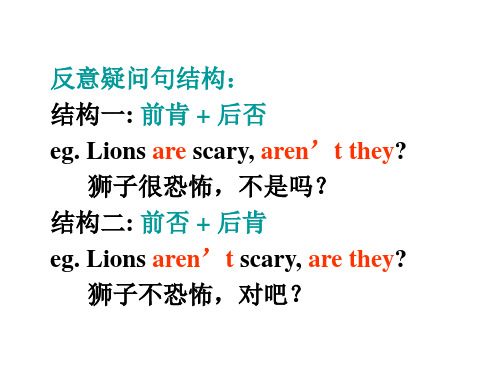
特殊用法8 陈述部分是感叹句,反义疑问句的用法:
isn’t he • What a clever boy, ______________? isn’t he • How rude the boy is, ______________?
特殊用法9
如果陈述部分的主语是this/that 或these/those,反 义疑问句的主语就用it或they.
结构一: 前肯 + 后否 be 动词: 1. You are an actor, __________? aren’t you 2. He is a good boy, ________? isn’t he wasn’t it 3. It was fine yesterday, _________? 4. You were studying when I called you last night, ___________? weren’t you 5. She is going to visit me, _________? isn’t she
特殊用法4
陈述部分如果有否定意义的词,如: hardly (几乎不) , never (从不) , nothing, few, little, no, seldom (很少), nowhere,rarely, too…to(太…以至于不能) 等, 这时疑问部分要 用肯定形式。
he • 1.Mr. Smith can hardly speak Chinese, can ________? she • 2.She has never been to Hong Kong,has ___________? • 3.There is nothing important in the newspaper, is there ______________? do they • 4.Few people eat wild animals now, __________? does he • 5.He knows little German, ____________ ? • 6.You have seldom met him recently, ________ ? have you
反义疑问句2

反义疑问句I.Change the following sentences into passive voice.1.People make the history.The history ________ _________ by the people.2.The workers made these new cars in Tianjing last year.The new cars ________ _________ in Tianjing last year.3.We will ask John to attend the lecture.__________ will ________ _________ to attend the lecture.4.They are building a new railway now.A new railway __________ ________ _________ now.5.The workers were widening the road this time last year.The road __________ ________ _________this time last year.6.His boss will send him to work in Shanghai.He __________ ________ _________ to work in shanghai by his boss.7.They had built a new hotel when I got there.A new hotel __________ ________ _________ when I got there.8.He said they would build a new hotel in two months.He said a new hotel __________ ________ _________ in two months.9.Young people don’t like this song.This song __________ ________ by young people.10.The Roman didn’t build Rome in one day.Rome __________ ________ in one day.11.Do the Chinese use the computers?____________ computers ____________ by the Chinese?12.Did they make these computers in the U.S.A?_____________ these computers ____________ in the U.S.A?13.What language do the Chinese speak?What language __________ ________ by the Chinese?14.Who will repair the broken window?__________ ________ will the broken window __________ ________? 15.Did Tom use it?_____________ it ____________ by Tom?16.Where did you make them?Where _____________ they____________?17.Tom gave me a present.I __________ ________ a present.A present __________ ________ _________ me by Tom.18.He teaches us English.English __________ ________ _________ us.We __________ ________ English.19.He bought me a book.I __________ ________ a book.A book __________ ________ _________ me.20.We can change water into ice.________ can __________ _________ into ice.21.Can I use it?Can _________ _________ _________ __________ ________?22.He can’t answer the question in English.__________ ________ can’t __________ ________ in English.23.They hold a sports meeting once a year.A sports meeting __________ ________ once a year.24.They gave us some nice presents on Children’s Day.__________ ________ _________ were given ________ ________ on Children’s Day.______ were _________ __________ __________ __________ on Children’s’ Day.25.The teachers don’t teach us French in our school._______ isn’t ___________ ___________ ___________in our school._______ aren’t ____________ ___________ in our school.26.When did they build these highrises?When __________ ____________ ___________ ___________ ?27.Mary will sing us some English songs.______ will __________ __________ some English songs by ________.Some English songs will _______ _______ ______ ________ by_________.28.We should take the old man to the nearest hospital._______ ______ _______ should _______ _______ to the nearest hospital.29.Do thousands of people visit the Palace Museum everyday?________ the Palace Museum _______ _______ thousands of peopleeveryday?30.They sell this kind of computers in that shop.This kind of computers __________ ____________ in that shop.31.Did Luxun write this book?_________ _________ __________ __________ by __________?32.He’s going to book the tickets for the match soon.The tickets for the match ______ ______ ______ ______ ______ soon.33.What shall we do at the moment?_______ shall _________ __________ at the moment?34.We need food every day.___________ is ___________ every day.plete the following sentences.1.这家商店不卖这种自行车。
(完整版)反义疑问句的用法归纳及习题

(完整版)反义疑问句的⽤法归纳及习题反意疑问句【反意疑问句】(⼀)概念:反意疑问句是由陈述句和附在其后的附加疑问句组成。
其中附加疑问句是对陈述句所说的事实或观点提出疑问,起证实作⽤,⼀般⽤于证实说话者所说的事实或观点。
(⼆)要点注意:1、反意疑问句前后两部分谓语应是:“肯定陈述+否定疑问”或“否定陈述+肯定疑问”。
2、简略问句如果是否定式:not应与be,do,will等系动词、助动词、情态动词缩写。
3、简略问句的主语不⽤名词,应⽤⼈称代词。
4、陈述部分含“too...to”时,是否定句。
(三)⽤法:1) 陈述部分I am时,疑问部分要⽤aren't I.I'm as tall as your sister,aren't I?(我和你姐姐⼀样⾼,对吗?)2) 陈述部分⽤no, nothing, nobody, never, few, little, seldom, rarely,hardly等否定含义的词时,疑问部分⽤肯定含义。
如:The old man made no answer, did he?Jim is never late for school, is he?3) 陈述部分有情态动词have to +v. (had to + v.),疑问部分常⽤don't +主语(didn't +主语)。
We have to get there at eight tomorrow, don't we?used to,疑问部分⽤didn't +主语或usedn't +主语。
He used to take pictures there, didn't he? / usedn't he?had better(最好)+ v. 疑问句部分⽤hadn't you?You'd better read it by yourself, hadn't you?4) 陈述部分有would rather(宁可、宁愿)+v.,疑问部分多⽤wouldn't +主语。
反意疑问句的前2种类型知识讲解

反意疑问句的前2种类型知识讲解编者按:反意疑问句,在陈述句后面加上一个意思与之相反的短小问句,常见的两种类型:肯定式+否定式;否定式,+肯定式。
下面小编就来带你一起学习下反意疑问句的前二种句型,希望对大家有帮助。
反意疑问句1陈述句(肯定式),+疑问部分(否定式)?You are students, aren’tyou?(你们是学生,不是吗?)Yes,we are.是,我们是。
或者:No, we aren’t.不,我们不是。
模仿造句:你是护士吗,不是吗?/是的,我是。
/不,我不是。
Tom speaks Chinese, doesn’the?(享利会说中文,不是吗?)Yes, he does. 是的,他会说。
或者:No, he doesn’t. 不,他不会。
模仿造句:杰克认识莉莉,不是吗?/是的,他认识。
/不,他不认识。
She has been to the Great Wall, hasn’t she?(她去过长城,不是吗?)Yes, she has.是的,她去过。
或者:No, she hasn’t.不,她没去过。
模仿造句:他已经成了专家,是不是?/是的,他已经成专家。
/不,他还没成。
2陈述句(否定式),+疑问部分(肯定式)?这种反意疑问句与上一种的结构略有不同,即否定式和肯定式的位置交换了,这一点很简单。
关键点在于回答,你暂且不必管这种回答的习惯与中文不同,只管这样回答就对:肯定回答用:Yes, +肯定结构。
否定回答用:No, +否定结构。
He isn’t at honest man, is he?(他不是老实人,是吗?)Yes,he is.不,他是(老实人)。
No,he isn’t.是,他不是(老实人)。
模仿造句:她不会唱英文歌,是吗?/不,她会唱。
/是,她不会唱。
She hasn’t finished her work, has she?(她还没完成工作,是吗?)Yes,she has.不,她已经完成了。
2反义疑问句练习1
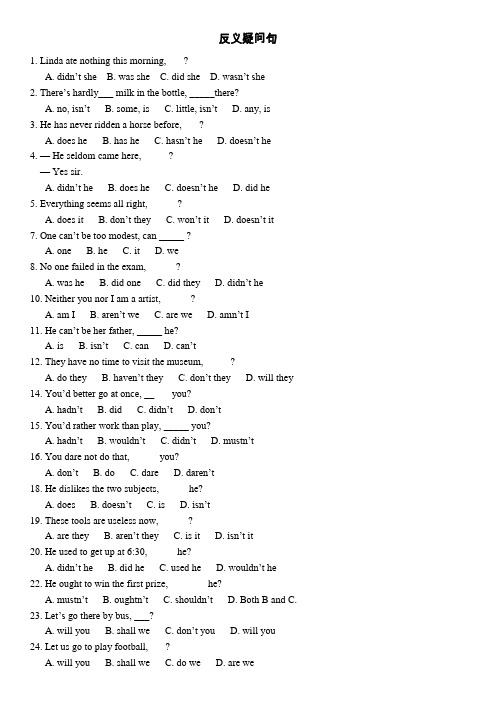
反义疑问句1. Linda ate nothing this morning, ___?A. didn’t sheB. was sheC. did sheD. wasn’t she2. There’s hardly___ milk in the bottle, _____there?A. no, isn’tB. some, isC. little, isn’tD. any, is3. He has never ridden a horse before, ___?A. does heB. has heC. hasn’t heD. doesn’t he4. — He seldom came here, _____?— Yes sir.A. didn’t heB. does heC. doesn’t heD. did he5. Everything seems all right, _____ ?A. does itB. don’t theyC. won’t i tD. doesn’t it7. One can’t be too modest, can _____ ?A. oneB. heC. itD. we8. No one failed in the exam, _____ ?A. was heB. did oneC. did theyD. didn’t he10. Neither you nor I am a artist, _____ ?A. am IB. aren’t weC. are weD. am n’t I11. He can’t be her father, _____ he?A. isB. isn’tC. canD. can’t12. They have no time to visit the museum, _____?A. do theyB. haven’t theyC. don’t theyD. will they14. You’d better go at once, _____ you?A. hadn’tB. didC. didn’tD. don’t15. You’d rather work than play, _____ you?A. hadn’tB. wouldn’tC. didn’tD. mustn’t16. You dare not do that, _____ you?A. don’tB. doC. dareD. daren’t18. He dislikes the two subjects, _____ he?A. doesB. doesn’tC. isD. isn’t19. These tools are useless now, _____ ?A. are theyB. aren’t theyC. is itD. isn’t it20. He used to get up at 6:30, _____ he?A. didn’t heB. did heC. used heD. wouldn’t he22. He ought to win the first prize, _______ he?A. mustn’tB. oughtn’tC. shouldn’tD. Both B and C.23. Let’s go there by bus, ___?A. will youB. shall weC. don’t youD. will you24. Let us go to play football, ___?A. will youB. shall weC. do weD. are we25. Don’t forget to give Polly some food and change her water, ___?A. will youB. shall weC. won’t youD. do you26. —Let’s go shopping this afternoon, _____?— All right.A. will weB. shall weC. don’t weD. are we27. — Pass me the dictionary, _____?— Yes, with pleasure.A. would youB. will youC. won’t youD. wouldn’t you30. There is little water in the glass, ____?A. isn’t thereB. isn’t itC. is itD. is there32. There won’t be any concert this Saturday evening, _____ ?A. will there notB. will thereC. is thereD. won’t33. — I guess she taught herself Japanese, ______?— Yes.A. don’t IB. did sheC. do ID. didn’t she34. I don’t believe you are right, _____ ?A. are youB. do youC. won’t youD. do35. She doesn’t think that Tom sings best in the class, _____ ?A. does sheB. doesn’t sheC. does heD. doesn’t he37. I know you didn’t want t o hurt me, _____ ?A. did youB. didn’t youC. do ID. don’t I38. If my father were here he would be very happy, _____ ?A. weren’t heB. were heC. wouldn’t heD. would heKey: 1—5 CDBDD 6—10 BACDC 11—15 AABAB 16—20 CCBBA 21—25CDBAA 26—30 BBBAD31—35 BBDAA 36—38 AAC。
反义疑问句的用法和练习

反义疑问句的用法和练习一、反意疑问句的意义及其构成反意疑问句又叫附加疑问句,是指当提问的人对前面所叙述的事实不敢肯定,而需要向对方加以证实时所提出的问句。
其结构为:前一部分是一个陈述句,后一部分是一个简单的问句。
完成后一部分简单问句时,要根据前面陈述句的动词时态和人称来选择适当的助动词进行提问,前后两部分的人称和动词时态要保持一致。
如果前一部分用肯定式,后一部分一般用否定式;反之,前一部分为否定式,后一部分要用肯定式,即“前肯定后否定,前否定后肯定”。
二、简单句式结构中反意疑问句的运用反意疑问句运用于简单句式结构中时,我们应注意掌握以下几个方面1、当陈述句部分的主语是名词时,反意疑问句的主语必须用人称代词来代替。
例Your brother has gone to the library, hasn’t he? 你弟弟去图书馆了,是吗?2、当陈述句的主语是指示代词this, that时,反意疑问句的主语用it代替;指示代词是these, those时,反意疑问句的主语用they代替。
例That isn’t a useful book, is it? 那不是一本有用的书,是吗?These are important reading materials, aren’t they? 这些都是重要的阅读材料,是吗?3、当陈述句部分是I am…时,反意疑问句部分通常要用aren’t I;如陈述句部分的主语是I am not时,反意疑问句部分通常要用am I。
例I’m late for the meeting, aren’t I? 我开会迟到了,是吗?I’m not doing well, am I? 我干得不好,是吗?4、当陈述部分是everyone / everybody, someone / somebody, no one / nobody, none等表示人的不定代词时,反意疑问句部分的主语多用they,但也可用he;当陈述部分的主语是everything, anything, something, nothing等表示物的不定代词时,反意疑问句部分的主语用it。
反义疑问句2
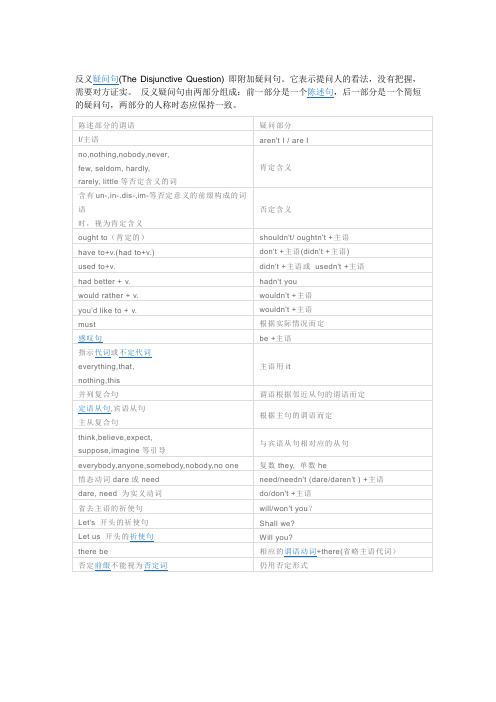
反义疑问句(The Disjunctive Question) 即附加疑问句。
它表示提问人的看法,没有把握,需要对方证实。
反义疑问句由两部分组成:前一部分是一个陈述句,后一部分是一个简短的疑问句,两部分的人称时态应保持一致。
陈述部分的谓语疑问部分I/主语aren't I / are Ino,nothing,nobody,never,肯定含义few, seldom, hardly,rarely, little等否定含义的词含有un-,in-.dis-,im-等否定意义的前缀构成的词语否定含义时,视为肯定含义ought to(肯定的)shouldn't/ oughtn't +主语have to+v.(had to+v.) don't +主语(didn't +主语)used to+v.didn't +主语或usedn't +主语had better + v.hadn't youwould rather + v. wouldn't +主语you'd like to + v. wouldn't +主语must 根据实际情况而定感叹句be +主语指示代词或不定代词主语用iteverything,that,nothing,this并列复合句谓语根据邻近从句的谓语而定定语从句,宾语从句根据主句的谓语而定主从复合句think,believe,expect,与宾语从句相对应的从句suppose,imagine等引导everybody,anyone,somebody,nobody,no one 复数they, 单数he情态动词dare或need need/needn't (dare/daren't ) +主语dare, need 为实义动词do/don't +主语省去主语的祈使句will/won't you?Let's开头的祈使句Shall we?Let us开头的祈使句Will you?there be相应的谓语动词+there(省略主语代词)否定前缀不能视为否定词仍用否定形式。
- 1、下载文档前请自行甄别文档内容的完整性,平台不提供额外的编辑、内容补充、找答案等附加服务。
- 2、"仅部分预览"的文档,不可在线预览部分如存在完整性等问题,可反馈申请退款(可完整预览的文档不适用该条件!)。
- 3、如文档侵犯您的权益,请联系客服反馈,我们会尽快为您处理(人工客服工作时间:9:00-18:30)。
反意疑问句归纳:1)反意疑问句由两部分组成:前一部分陈述,后一部分提问。
2)如果前一部分用肯定形式,后一部分就用否定形式;如果前一部分用否定,后,部分就用肯定形式。
即:前肯后否,前否后肯。
3)如果前句的谓语是行为动词,则反意疑问部分需借助助词do, don’t dose doesn’t或did(didn’t),需使用哪一个,视乎时态、人称而定。
一些特殊的反意疑问句:1.陈述部分的主语是I'm...句型时,疑问部分要用aren't I。
如:I'm an English teacher, aren't I? 我是一名英语老师,不是吗?2.陈述部分是感叹句时,疑问部分用be +主语。
如:What beautiful hats, aren't they? 多么漂亮的帽子,不是吗?3.陈述部分是省去主语的祈使句时,疑问部分用will you。
如:Don't be late next time, will you? 下次不要迟到了,好吗?Come here, will you / won't you? 到这儿来,好吗?注意:Let's 开头的祈使句,疑问部分用shall we,Let us 开头的祈使句,疑问部分用will you。
如:Let's start with the song, shall we? 咱们以这首歌开始,好吗?Let us help you, will you? 让我帮助你,好吗?4.陈述部分的谓语是wish,疑问部分要用may +主语。
如:I wish to go to Beijing, may I? 我希望去北京,好吗?5.陈述部分用no, nothing, nobody, never, few, seldom, hardly, rarely, little等否定含义的词时,疑问部分用肯定含义。
如:They never go there, do they ? 他们从不去那儿,是吗?6.含有ought to 的反意疑问句,陈述部分是肯定的,疑问部分用shouldn't / oughtn't +主语。
如:He ought to know what to do, oughtn't he? / shouldn't he? 他应该知道该做什么,对吗?7.陈述部分有have to +v. (had to + v.),疑问部分常用don't +主语(didn't +主语)。
如:We have to sleep here, don't we? 我们必须睡在这儿,对吧?8.must在表“推测”时,根据其推测的情况来确定反意疑问句。
如:He must be Tom, isn't he?他一定是汤姆,不是吗?It must be going to rain tomorrow, won't it? 明天肯定要下雨,是吗?9.陈述部分的谓语是used to 时,疑问部分用didn't +主语或usen't +主语。
如:He used to be a bad boy, didn't he? / usen't he?他过去是个坏男孩,是吧?10.陈述部分有had better + v.,疑问句部分用hadn't you。
如:You'd better go there now, hadn't you?你最好现在去那儿,好吗?11.陈述部分有would rather +v.,疑问部分多用wouldn't +主语。
如:He would rather read it ten times than recite it, wouldn't he?他宁可读十遍也不愿意背诵,是吗?12.陈述部分有You'd like to +v.,疑问部分用wouldn't +主语。
如:You'd like to go to bed earlier, wouldn't you? 你想早点儿睡觉,对吗?13.陈述部分有must,疑问部分根据实际情况而定。
如:He must be a doctor, isn't he? 他肯定是医生,是吗?You must have studied English for four years, haven't you? / didn't you?你一定学了四年英语,对吗?He must have finished it yesterday, didn't he? 他肯定是在昨天完成任务的,是吗?14.陈述部分由neither... nor, either... or 连接的并列主语时,疑问部分根据其实际逻辑意义而定。
如:Neither you nor I am a teacher, are we? 你不是老师,我也不是,对吗?15.陈述部分主语是指示代词或不定代词everything, that, nothing, this, 疑问部分主语用it。
如:Everything is ready, isn't it? 一切就绪,是吗?16.陈述部分为主语从句或并列复合句,疑问部分有三种情况:a. 并列复合句的疑问部分,谓语动词根据邻近从句的谓语而定。
如:Mr. Smith had been to Shanghai for several times, he should have been in China now, shouldn't he?史密斯先生曾几次去过上海,按理说他现在应该在中国,是吗?b. 带有定语从句,宾语从句的主从复合句,疑问部分谓语根据主句的谓语而定。
如:He said he wanted to visit Urumchi, didn't he?他说他想去乌鲁木齐看看,他是那样说的吗?c. 陈述部分主句为第一人称,谓语是think, believe, expect, suppose, imagine等引导的宾语从句,疑问部分与宾语从句相对应构成反意疑问句。
如:I don't think he is clever, is he? 我认为他并不聪明,是吗?We believe she can do it better, can't she? 我们相信她能做得更好,她不能吗?17.陈述部分主语是不定代词everybody, anyone, somebody, nobody, no one等,疑问部分常用复数they,有时也用单数he。
如:Everyone knows the answer, don't they? (doesn't he?)人人都知道答案,是这样吧?Nobody knows about it, do they? (does he?)没人知道这件事,是吧?18带情态动词dare或need的反意疑问句,疑问部分常用need (dare )+主语。
如:We need not do it again, need we ? 我们不必重做一遍,是吗?He dare not say so, dare he? 他不敢这样说,是吗?当dare, need 为实义动词时,疑问部分用助动词do + 主语。
如:She doesn't dare to go home alone, does she? 她不敢独自回家,是吗?19.陈述部分是“there be”结构的,疑问部分用there省略主语代词。
如:There is something wrong with your watch, isn't there? 你的表有问题,对不对?There will not be any trouble, will there? 不会有麻烦吧,是吗?20.否定前缀不能视为否定词,其反意疑问句仍用否定形式。
如:It is impossible, isn't it? 这不可能,不是吗?He is not unkind to his classmates, is he? 他不会对他同学使坏,是吗单项选择1. It’s the third time that John has been late, ____?A. hasn’t heB. isn’t heC. isn’t itD. hasn’t it2. Let’s take a rest, ___________.A. will weB. shall weC. shan’t weD. won’t we3. Let us pass, _________?A. shan’t weB. shall weC. won’t weD. will you4. Wait a minute, __________?A. shall youB. will youC. do youD. don’t you5. The suit’s finished, __________?A. doesn’t itB. isn’t itC. haven’t youD. hasn’t it6. He’s posted the letter, _________he?A. isn’tB. doesn’tC. hasn’tD. wasn’t7. They’d go with us, __________?A. wouldn’t theyB. didn’t theyC. h adn’t theyD. couldn’t they8. What fresh air, ________?A. is itB. does itC. isn’t itD. doesn’t it9. The Emperor’s clothes became the talk of the whole city, _________?A. did itB. didn’t itC. did theyD. didn’t they10. Mr. And Mrs. Turner work in this hospital, ________?A. are theyB. aren’t theyC. do theyD. don’t they11. She has breakfast at six every day, ________?A. has sheB. hasn’t sheC. does sheD. doesn’t she12. Nothing seems to please her, _________?A. does itB. doesn’t itC. is itD. isn’t it13. She never tells a lie, ________?A. does sheB. doesn’t sheC. is itD. isn’t it14. You hardly know each other, _________?A. do youB. don’t youC. have youD. didn’t you15. The man in blue must be your brother, _____?A. mustn’t heB. needn’t heC. isn’t heD. is he16. I don’t think he will come to our party, _____?A. will heB. won’t heC. does heD. do I17. I suppose he’s serious, ___________?A. do IB. don’t IC. is heD. isn’t he18. Wang said that he was not there then, _____?A. did heB. didn’t heC. was heD. wasn’t he19. You daren’t say that to him, _________?A. dare youB. do youC. daren’t youD. don’t you20. You must have read about Dickens long ago, __________?A. mustn’t youB. haven’t youC. can’t youD. didn’t you21. You’d better not smoke here, ________?A. will youB. shall youC. have youD. had you22. There isn’t going to be a volleyball match next week, __________?A. is itB. isn’t itC. is thereD. isn’t there23. There used to be a church behind the cemetery, _____________?A. didn’t thereB. used thereC. usedn’t itD. didn’t it24. What a lovely day, _________?A. doesn’t itB. hasn’t itC. won’tD. isn’t it25. You must have been there, ____________?A. have youB. did youC. haven’t youD. didn’t you26. That is your school, ___________?A. isn’t thatB. mustn’t itC. isn’t itD. won’t it27. She dislikes this skirt, _________________?A. doesn’t sheB. does sheC. isn’t sheD. is she28. No one can stop us from going there, ______?A. can’t itB. can theyC. can’t theyD. can one29.--- Where is your father? --- Oh, __________ .A.here comes he B.here does he come C.he here comes D.here he comes 30.Look, _________ .A.here the bus comes B.here is the bus comingC.here comes the bus D.here the bus is coming31.________ , I would have phoned you.A.If I knew it B.Had I known it C.If I know it D.Did I know it 32._________ in the river yesterday, the boy _________ .A.Were Mr Black not; would not be drownedB.Were Mr Black ; would be drownedC.Had Mr Black not been; would have been drownedD.Hadn't Mr Black been; would have drowned33.--- It was cold yesterday. --- __________ . Which of the following is wrong?A.So it was B.So is it todayC.So was it the day before D.So it did34.--- She's passed the entrance examination. --- ____ .A.So am I B.So have I C.So I have D.Also I have35.________ that he found it difficult to stop at the red light.A.So fast he was driving B.So fast he droveC.So fast was he driving D.So fast drive he36.Hardly ___________ the railway station when the train started.A.did reach B.had I reached C.I reached D.I had reached37.No sooner _________ asleep than she heard a knock at the door.A.she had fallen B.had she fallen C.she had fell D.had she fell38.Only after his death __________ considered correct.A.was his theory B.his theory was C.did his theory D.had his theory39._________ his appearance that no one could recognize him.A.So was strange B.Was so strange C.So strange was D.Strange so was40.__________ about her illness and still worked very hard.A.She knows little B.Little did she knowC.Little does she know D.She didn't know something41.Only when the line was fixed _________ from floating away from the spaceship.A.could he keep B.he could keep C.he could be kept D.could he be kept 42.__________ , she wanted to buy her husband a Christmas gift.A.As she was short of money B.Though money is shortC.She was short of money D.Short of money as she was43._________ about the universe up till now.A.We know quite a lot B.Only little we have knownC.Very little have we known D.So much we do know44._________ , she was very brave.A.Girl as she was B.As she was a girl C.A girl as she was D.Girl as was she 45.Such _________ the results of the experiments.A.is B.was C.are D.as be46.Albert Einstein cared little for money. ___________ Professor Wang.A.Either did B.So was C.So did D.Neither did47.____ there no gravity, there would be no human beings on the earth.A.If B.If was C.If not D.Were48.Only when ________ the painting _________ decide whether the painting is worth buying.A.the sees; he can B.does he see; can heC.he sees; can he D.sees he; he can49.On the wall ___________ two large portraits.A.hangs B.hang C.hanged D.are hanging50._________ it rain tomorrow, we would have to put off the visit to the Yang pu Bridge.A.Were B.Should C.Would D.WillKeys:1~20: CBDBB CACDD DAAAC ADBAD21~40: DCADC CABDC BCDBC BBACB 41~50: DDCAC DDCBB。
